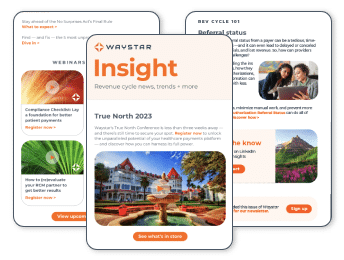You asked — we answered. After covering the ins and outs of the No Surprises Act, Waystar experts are now taking a deep dive into the NSA and Good Faith Estimates.
As a provider, you know just how important Good Faith Estimates for self-pay or uninsured patients are when it comes to staying in compliance. While it may seem simple on the surface, there are many scenarios that can blur the lines when giving cost estimates before care.
Get the latest updates and answers to the most pressing questions about Good Faith Estimates submitted by providers just like you. That way, you know what is (and isn’t) required for Good Faith Estimates as you navigate the No Surprises Act.
As a reminder, always consult with your legal team, compliance department or trade association if you have specific questions as to how the No Surprises Act requirements apply to your organization.
Will CMS enforce the requirement that Good Faith Estimates for uninsured or self-pay individuals include cost estimates from co-providers and co-facilities beginning on January 1, 2023?
No. The original requirement for enforcement was set to go into effect on January 1, 2023. However, the U.S. Department of Health and Human Services (HHS) has indicated that compliance “is likely not possible” by this date. Therefore, HHS is extending the enforcement provisions timeline, pending future rulemaking.
For more information, refer to this CMS document.
Has a new prospective date for compliance been released?
At this time, CMS has not provided a new enforcement deadline. According to documentation, CMS states any rulemaking to fully implement the requirements will include a prospective date that gives providers and facilities “a reasonable amount of time to comply with any new requirements.”
However, CMS encourages providers, facilities, and other industry members to continue making strides toward adopting interoperable technology and processes for exchanging information to help “improve the quality of care and promote a more efficient healthcare system.”
For more information, refer to this CMS document.
Is enforcement complaint-driven like HIPAA is? Is CMS or anyone auditing for Good Faith Estimates if there is no complaint?
We are unaware of an established audit process either by the federal or state government. At this time, we believe that a provider review would be driven based on patient complaints. However, always consult with your internal legal team or contact CMS at provider_enforcement@cms.hhs.gov for further clarification.
Is a Good Faith Estimate required if the patient does not want one?
Uninsured and self-pay patients are entitled to a Good Faith Estimate upon request or scheduling of an item or service through the No Surprises Act billing protections. Per the latest FAQ, the co-provider or co-facilities fees are not required, the estimate is still required to include the convening provider charges. For more information, refer to this CMS document.
According to CMS, a paper or printable electronic copy of the GFE is integral as it is a required input for the patient-provider dispute resolution (PPDR) process that the uninsured or self-pay individual can use if the actual billed charges exceed the GFE by at least $400. When initiating the PPDR, the uninsured or self-pay individual must submit a copy of the GFE.
If a patient has an office visit and then is set up for a same-day surgery, is a Good Faith Estimate required?
A Good Faith Estimate is for scheduled services for uninsured patients and patients who choose not to file insurance. Any item or service ordered for the same day, not reasonably expected in advance, or scheduled fewer than three business days beforehand would be excluded from the Good Faith Estimate requirement. For more guidance about Good Faith Estimates, refer to this CMS document.
If Good Faith Estimates are not required for same-day or walk-in appointments, what about Good Faith Estimates for patients in the emergency department who are admitted for an inpatient hospital stay?
A Good Faith Estimate for uninsured or patients who choose not to file insurance is not required for emergency stays. For out-of-network insurance, payers are required to initially pay with a Qualifying Payment Amount (QPA) and providers cannot balance bill the patient. They can only bill patient in-network cost shares.
If a patient is being scheduled for surgery at a hospital, are providers the ones responsible for obtaining Good Faith Estimates from co-providers before scheduling the patient for surgery?
The convening provider is responsible for obtaining the Good Faith Estimates from the co-providers once the procedure is scheduled. If this presents itself as a challenge to your organization, Waystar recommends contacting CMS directly with feedback and for any clarification.
You can send any questions about the provider requirements to provider_enforcement@cms.hhs.gov. Please also refer to CMS’s Good Faith Estimate FAQ’s related to reasonably known services.
What happens if the initiating provider listed on the Good Faith Estimate is unavailable for the following stabilization visit? Can another provider in the group cover that second visit without having to create a new Good Faith Estimate?
This is dependent on the timing of the information. For more information, send any questions to provider_enforcement@cms.hhs.gov.
What happens if a service is provided that is not covered by Medicare and the patient must pay for the service? Does the Good Faith Estimate pertain to those patients?
Medicare is excluded from the No Surprises Act protections. Patients are required to sign an Advance Beneficiary Notice of Noncoverage (ABN) if the service is not covered by Medicare, and the ABN has its own rules.
Grow your understanding of Good Faith Estimates
Each self-pay or uninsured patient is different, which can cause confusion for when to provide a Good Faith Estimate. However, by strengthening your understanding of the No Surprises Act, you can feel confident you are providing Good Faith Estimates in the right scenarios.
When a challenging situation arises, use the resources you have — such as your legal team, compliance department or trade association — to ensure you remain in compliance. You can also reach out to CMS directly at provider_enforcement@cms.hhs.gov for more information or to get specific answers for your organization’s situation.
Find this information helpful? Learn how to detangle the No Surprises Act.


